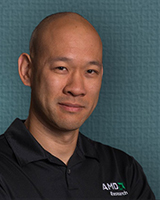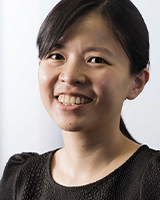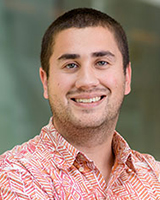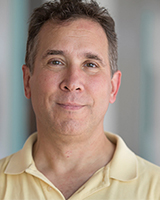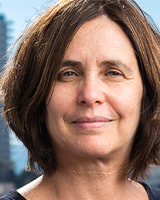The Allen School is pleased to announce the 2021-22 Distinguished Lecture Series, which kicks off today. Join us over the coming season to hear from experts in microarchitecture, theoretical computer science, artificial intelligence sustainability, low-and no-power devices and a new paradigm for truly extending computer science education to all.
All lectures will take place at 3:30 p.m. in the Amazon Auditorium in the Gates Center and will be live streamed on the school’s YouTube channel.
Dec. 2: Gabriel H. Loh, senior fellow for AMD Research
Gabriel H. Loh will deliver a talk on Thursday, Dec. 2 about “The Motivation for Chiplets and their Adoption in AMD Processors.” Under Moore’s Law, computer systems that once took up an entire warehouse can now fit on an integrated circuit. But the rate of advancements in silicone processes has slowed recently, while manufacturing costs have risen. To address this problem, AMD has opted to break down systems on chips into smaller “chiplets.” Loh will discuss the technical challenges that spurred the company to focus on chiplets as a solution and how they were able to extend their use beyond individual processors.
At AMD Research, Loh focuses on cutting-edge technologies for CPU and GPU microarchitecture, high-speed interconnections, memory systems and component integration. He also oversees patent generation activities. Loh earned the ACM SIGARCH Maurice Wilkes Award from the Association for Computing Machinery’s Symposium on Computer Architecture for his contributions to the field.
Dec. 9: Carole-Jean Wu, research scientist and manager at Facebook AI Research
Wu’s research at Facebook focuses on high-performance and energy-efficient architecture through hardware heterogeneity, energy harvesting techniques for emerging computing devices, and temperature and energy management for portable electronics. She recently veered into designing systems for machine learning execution at scale as part of her drive to tackle system challenges to enable more efficient, responsible AI.
Carole-Jean Wu will give a lecture on Dec. 9 called “Scaling AI Sustainably: Environmental Implications, Challenges and Opportunities.” Wu’s talk will explore the increasing carbon footprint of AI computing and how hardware and software design and at-scale optimization can reduce the overall impact. She will also discuss new research directions that can help ensure the field of AI advances in an environmentally responsible way.
Jan. 20: Josiah Hester, Breed Chair of Design, Segal Faculty Fellow, and professor of computer engineering at Northwestern University
Josiah Hester will deliver a talk on Jan. 20 called “Batteries Not Included: Reimagining Computing for the Next Trillion Devices.” Powering computer systems in the future needs to rely less on batteries and wall outlets and more on less expensive, sustainable means. Hester will discuss a rethinking of hardware, software, design and tool creation that isn’t dependent on current power systems and what research in that field will look like in the next 10 years.
From soil-powered sensors to smart face masks, Hester’s research at Northwestern focuses on a more sustainable future for computing, inspired by his Native Hawaiian (Kanaka maoli) heritage. To that end, he focuses on the development of battery-free smart devices and systems for intermittent computing that support a range of applications, including health care, conservation, and infrastructure monitoring.
Jan. 27: Mark Guzdial, professor of computer science & engineering at the University of Michigan
Mark Guzdial will give a lecture on Jan. 27 on “Changing Computing To Make It ‘For All.’” Returning to the original concept that computer science should be taught to everyone just like math, reading and the natural sciences, Guzdial will examine how we need to change our approach to teaching computing to ensure it isn’t just a privileged class that understands it. He will review the history of computer science and its early purpose, the barriers to reaching universal computational literacy, and what new kinds of languages and the tools will be needed to extend this knowledge to everyone.
With a focus on computer education research, learning sciences, education public policy and task-specific programming languages, Guzdial studies how people come to understand computing and how to make that process more effective. He co-founded the Association for Computing Machinery’s International Computing Education Research Conference and helped to lead the National Science Foundation-fundedExpanding Computing Education Pathways Alliance to improve computing education in the United States.
Feb. 17: Shafi Goldwasser, director of the Simons Institute for the Theory of Computing and C. Lester Hogan Professor in Electrical Engineering and Computer Sciences at the University of California, Berkeley
Shafi Goldwasser’s research interests span cryptography, computational number theory, complexity theory, fault tolerant distributed computing, probabilistic proof systems and approximation algorithms. She is the co-leader of the Cryptography and Information Security (CIS) Group and a member of the Complexity Theory Group within the Theory of Computation Group and the Laboratory for Computer Science. She received the ACM Turing Award — computing’s highest honor, otherwise known as the “Nobel Prize of computing” — in 2012, and the Gödel Prize in 1993 for “The Knowledge of Interactive Proof Systems” and again in 2001 “Interactive Proofs and the Hardness of Approximating Cliques.”
For more details and future updates, be sure to check out our Distinguished Lecture Series webpage. And please plan to join us in person or online, starting with today’s talk by Gabriel Loh!


